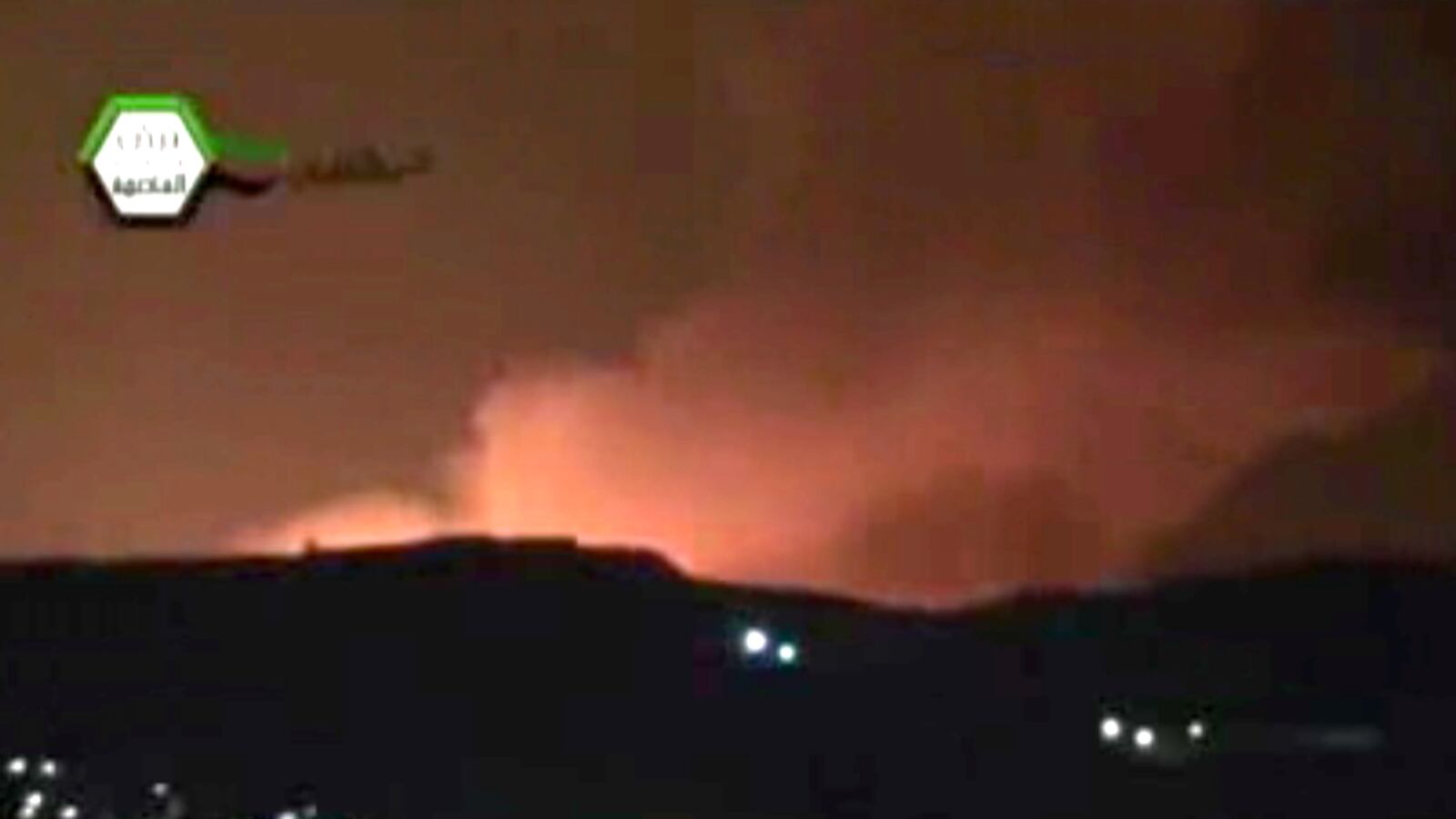On April 29, at Blair House, Arab League ministers led by Qatar's Prime Minister Hamad bin Jassim al-Thani reiterated their commitment to the Arab Peace Initiative, including a (by now, familiar) proposed finesse, that the 1967 border might be adjusted with land swaps to accommodate the large settlement blocs. Three days later, on May 1 (and again on May 3), Israeli aircraft attacked an apparent cache of Hezbollah-bound Iranian weapons near Damascus, attacks embattled President Assad called an act of war demanding retaliation, and which the same Arab League ministers, no friends of Assad, roundly condemned.
It is hard to imagine a juxtaposition capturing so vividly Israel's way forward in "the region." Benjamin Netanyahu's government did not exactly reject the Qatar initiative and even dispatched Justice Minister Tzipi Livni to explore things with Secretary Kerry. But the attacks in Damascus seem a truer, or at least more urgent, expression of popular attitudes the government derives its mandate from. Israelis have always seen the logic of current military preemption more clearly than that of eventual diplomatic engagement. This won't change.

One former intelligence head—a man who, fearing a general regional war, has been outspoken in his opposition to attacks on Iranian nuclear installations and even advocated negotiations with Hamas—told me in Washington last week that if Iran grows its military footprint in Syria (elements of the Revolutionary Guard are already there), then all Israelis would be united behind the IAF attacking Iranian forces there. "We simply cannot tolerate Iranians on our borders," he said. And what of the Arab Peace Initiative? "The original Saudi Plan made no mention of Palestinian refugees," he added gravely. Hameivin yavin.
Some of this is just a professional default. Intelligence officials tell you that Arab enemies must be judged in terms of their capabilities and motives. Officials are paid to understand something about capabilities; as to motives, nobody is paid to be Dostoyevsky. They may study the various "ideologies." But they really assume that motives flow from power and, besides, what can Israelis (Jews, "Zionists," etc.,) do but demotivate Arabs by reducing their capabilities?
The neighborhood, in other words, is dangerous. Given what's happening in Syria, you have to be blind not to see this. So, no, don't attack Iranian nukes, but perhaps Israel has no better course on Palestine than to wait out the regional violence, reinforce its "deterrence," and defer the peace process. Jeffrey Goldberg, with typical brio, captured this attitude (in a somewhat different context) last year: "If you’re an Israeli, you look at the last twelve years... and [say], 'Now’s the moment when you want me to pull out of territory on the West Bank, including the mountains that overlook Israel’s central cities and its airport? Right now?'"
I could pick nits with this intelligence official as with Goldberg. How would an attack on Iranians in Damascus not invite the same regional war that an attack on their nuclear installations would? Has not preemptive Israeli power, from the Suez War to Gaza, itself helped excite the fanaticism that's made the region so dangerous? Would not more attacks on Damascus touch off a widening war, in which Assad desperately tries to rally weakening forces in the Syrian opposition to stand against Israel, say, by launching (or encouraging Hezbollah to launch) missiles at Israeli cities? As for Goldberg, when you put things the way he does, how does "Right now?" not translate as "Ever?"
Still, I am not writing to criticize either man. For I think that, taken together, their cautions expose the partialness of the peace movement's answers when immediate security issues come up, which is why our leaders and literary heroes never seem to know what to say when the IAF springs into action. ("Okay, bomb Gaza, but avoid civilian casualties, and stop sooner than the right says...")
No doubt, the peace camp has been broadly right to insist that reaching a deal on Palestine would, over time, seriously undermine jihadist and Islamic radicals, who cannot be expected to be more rejectionist regarding Israel's existence than the Palestinian people; that Israel cannot continue to defy the region and the world and expect to thrive or even survive. Anyway, that's the argument we've been making for two generations, though mainly to answer the settlers and their like, whose every excess has been rationalized by the claim that Arab enmity is natural, not historical.
Still, when you do look at what's unfolded in Syria (and Iraq, and Lebanon), it seems clear that settlers are not the peace movement's only foils, and we have meanwhile failed to acknowledge two inconvenient truths. The first is that the same post-Sykes-Picot world that left Lord Balfour's Britain in control of Palestine also left the Middle East full of weird and seriously fractionalized states, all potentially subverted by inflamed ethnic and religious minorities, potentially supported by brothers who are majorities in neighboring states. The second, that the same advanced technology that allows a small state like Israel to become a great power in a region where Israelis are out-numbered 50 to 1, also allows the smallest of inflamed factions the power to do Israeli cities enormous and disruptive and unacceptable damage.
The sad fact is that our region has evolved into the poster child for what Nassim Nicholas Taleb (who began to shape his theories as as a youth in war-torn Lebanon) has called "fragile": an interconnected system in which the smallest, eccentric, fanatic part—the people you don't ordinarily encounter, the "black swan"—can do catastrophic damage to the whole. For Israelis, relying on the good faith of the Palestinian majority will invite disaster, much like an airport that assumes a security screening process fit for the average traveler.
Yes, Israeli military intervention in Lebanon in the early 1970s helped inflame what needed to be contained. Yes, the same can be said for the U.S. invasion and occupation of Iraq. Yes, the occupation. But Syria? There, the factions needed only each other. Nobody knows where this will end. Goldberg may be demagogic at times, but he's right to assume an approach that does not simply entail "pull[ing] out of territory on the West Bank." No Israeli in his or her right mind will go for this, nor should any Palestinian. Which brings me back to the integration imperative I spoke about in my last post.
Given the scale and proximity of the states in question, no two state solution is conceivable—so I argued—apart from the confederal arrangements that would allow them grow by integrating a common (in effect,) urban infrastructure. The problem of security makes such integration all but inescapable. By speaking of a "demilitarized" Palestinian state—like the one Abbas offered Olmert—Palestinians have shown extraordinary goodwill; but when Israelis just take this for granted, we insult our Palestinian partners without really doing justice to the dangers and methods of contemporary terrorism, especially Jihadist terrorism, but settler terror as well: the dangers of shoulder-mounted anti-aircraft missiles, or chemical and biological agents, or attacks on the electric and telecommunications grid, attacks on water. Preparing for only the white swans, as Taleb warns, is just not good enough when the system is a highly interdependent and the means of destruction in the hands of a few outliers is so outsized.
Israelis particularly have come by their wariness honestly. As my friend Carlo Strenger has been emphasizing lately, the wave of suicide bombing that accompanied the Al-Aqsa intifada from 2000-2004 has left deep scars and a plausible sense of fragility, even among people who've been fighting the occupation their whole lives. Imagine not just one bomb killing and maiming civilians in Boston, but over 150 over four years. Now imagine that southern New Hampshire were a kind of Chechnya, and that radicals from Manchester placed the bombs; imagine that polls showed a majority of New Hampshire Chechens favored the bombs. Would people in Boston now be inclined to trust any plan in which some insane subset of New Hampshire Chechens could be in a position to fire missiles at Logan airport?
I know, I know, you also have to imagine also that Massachusetts occupied southern New Hampshire—cruelly, and with irredentist ambitions—and negotiations to end the occupation had been stuck. By the end of Oslo, the number of settlers doubled. I know also that Abbas and his brain-trust has condemned the intifada, the bombs, the violence. But who can guarantee Abbas can survive the radical forces roiling his own streets or the jihadist forces threatening Assad across the Syrian border? For Israelis, the enemy of my enemy is my enemy.
For that matter, will a Palestinian state be able to cope with potential Jewish terrorist groups which almost certainly will try to disrupt and discredit any settlement that potentially forces settlers out of hotbeds of fanaticism like Kadum or Kiryat Arba? Remember what De Gaulle had to deal with after Algeria? Now imagine that Algeria was a big city adjacent to Paris?
No, the terms of the Arab Peace Initiative, the borders, the all-sided recognition, the effort to deal with the refugees—all of these things—are only the beginning. We need to think about security cooperation much more deeply. I don't pretend that anyone has worked through the details yet, which may take months of management analysis and negotiations; but it will simply not be enough for Israelis and Palestinians to assume a solution in which two states arise, separate, and each has sole discretion over internal security.
During Oslo in the 1990s, until the start of the Al-Aqsa intifada, Hamas dissidents were responsible for virtually all Palestinian acts of terror, but Israel held Arafat's Palestinian Authority (which was vainly trying to jail Hamas people) accountable. The settler groups were responsible for Baruch Goldstein and Yigal Amir, but Palestinians saw "Israelis." This formula—"you're sovereign, so you're responsible"—is a recipe for disintegration. It makes any peace hostage to sociopaths.
Both states, rather, will have to agree in advance to shape confederal internal security institutions, almost certainly in conjunction with third parties like the FBI and Interpol to facilitate close cooperation. Until now, given the occupation, the on-the-ground intelligence gathered by Israel's security services (its "Gatekeepers") and by the PA's U.S.-trained police have been sources of repression and provocation. In any two state solution, intelligence and counter-terror methods can, and must, be shared. They will then be the source of both shared stability or shared responsibility for inevitable failures.
External security is a different matter, of course, and Israel will—for obvious reasons, and during our lifetimes—want to retain sole discretion over its defense forces. It will have its air force, combat divisions, cyber force, and nuclear arsenal, though ideally buttressed within an alliance like NATO.
But here, the Arab Peace Initiative might well be seen as an invitation to consider building toward collective security agreements, too. If you are Qatar or Bahrain or Saudi Arabia, your nightmare is Iran, not Zionism. Souad Mekhennet, the roving New York Times correspondent who has interviewed virtually every jihadist in the game, told me recently that in her view, an agreement on Palestine would not only greatly diminish the moral prestige of jihadist forces, and undermine the growing hatred for "Jews" and Americans, but that the Gulf states, Jordan, etc., would welcome an implicit alliance against Iranian ambitions.
The key for Israel, and Kerry, is a Syrian war that does not widen into a regional one, which could sweep away the Hashemite regime in Jordan, and put Israel into confrontation with groups supported by the very Gulf states offering peace. More Israeli attacks on Damascus, in this sense, cannot help. Offering Jordan aid in caring for Syrian refugees might.






